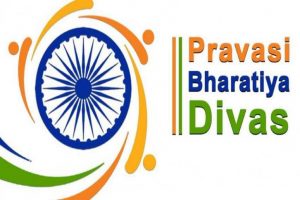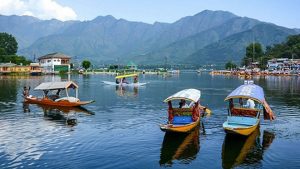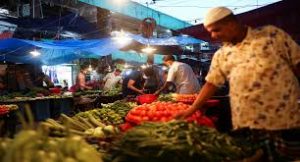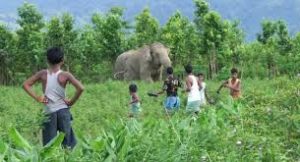Today Current Affairs: 8th January 2021 for UPSC IAS exams, State PSC exams, SSC CGL, State SSC, RRB, Railways, Banking Exam & IBPS, etc
Table of Contents
Contents:
- Pravasi Bharatiya Divas
- Digital services taxes
- Sixth-round of spectrum auction for radio waves
- New Industrial Development Scheme for Jammu & Kashmir (J&K IDS, 2021)
- 25th Amendment of the US Constitution
- World Food Price Index: FAO
- Human-Wildlife Conflict (HWC)
- First Advance Estimates (FAE) for the current financial year.
- Other important current affairs
1.Pravasi Bharatiya Divas:

The 16th Pravasi Bharatiya Divas Convention is being organized on 9th January 2021, despite the ongoing Covid pandemic.
About PBD:
- Pravasi Bharatiya Divas (PBD) is celebrated on 9th January to mark the contribution of the Overseas Indian community to the development of India.
- PBD Convention is the flagship event of the Ministry of External Affairs and provides an important platform to engage and connect with overseas Indians.
- PBD conventions were held every year since 2003.
- Since 2015, its format has been revised to celebrate the PBD once every two years.
- The theme of 16th PBD Convention 2021: “Contributing to Aatmanirbhar Bharat”.
- January 9 was chosen as the day to celebrate this occasion since it was on this day in 1915 that Mahatma Gandhi, the greatest Pravasi, returned to India from South Africa, led India’s freedom struggle, and changed the lives of Indians forever.
- These conventions provide a platform to the overseas Indian community to engage with the government and people of the land of their ancestors for mutually beneficial activities.
- These conventions are also very useful in networking among the overseas Indian community residing in various parts of the world and enable them to share their experiences in various fields.
2.Digital services taxes:

The Office of the United States Trade Representative (USTR) has said that the Digital services taxes adopted by India, Italy, and Turkey discriminate against US companies and are inconsistent with international tax principles.
The Office of the United States Trade Representative (USTR):
- It is responsible for developing and coordinating US international trade.
- Section 301 (US Trade Act) gives the USTR broad authority to investigate and respond to a foreign country’s action which may be unfair or discriminatory as well as negatively affect US commerce.
- Adopted through the 1974 Trade act, the Section allows the US President to impose tariffs or other curbs on foreign nations.
- However, the law mandates consultations with trading partners.
Digital Services Taxes (DSTs):
- These are the adopted taxes on revenues that certain companies generate from providing certain digital services. E.g. digital multinationals like Google, Amazon and Apple etc.
- The Organisation for Economic Cooperation and Development (OECD) is currently hosting negotiations with over 130 countries that aim to adapt the international tax system. One goal is to address the tax challenges of the digitalization of the economy.
- Some experts argue that a tax policy designed to target a single sector or activity is likely to be unfair and have complex consequences.
- Further, the digital economy cannot be easily separated out from the rest of the global economy.
India’s Tax on Digital Companies:
- The government had moved an amendment in the Finance Bill 2020-21 imposing a 2% digital service tax (DST) on trade and services by non-resident e-commerce operators with a turnover of over Rs. 2 crore.
- This effectively expanded the scope of equalization levy that, till last year, only applied to digital advertising services.
- Earlier, the equalization levy (at 6%) was introduced in 2016 and imposed on the revenues generated on business-to-business digital advertisements and allied services of the resident service provider.
- The new levy came into effect from 1st April 2020. E-commerce operators are obligated to pay the tax at the end of each quarter.
USTR’s Investigation Report:
- The DST in India is discriminatory because it exempts Indian companies and targets non-Indian firms.
This hits US firms that dominate the technology industry. - 119 companies that it identified as likely liable under the digital services tax, 86, or 72%, were American.
- USTR estimates that the aggregate tax bill for US companies could exceed USD 30 million per year.
- The USTR has determined that India’s DST is unreasonable or discriminatory and burdens or restricts US commerce and thus is actionable under Section 301 (US Trade Act).
- India has described the equalization levy as a fair, reasonable and non-discriminatory tax aimed at all offshore digital economy firms accessing the local market and has denied it targets US companies.
- It seeks to ensure a level-playing field with respect to e-commerce activities undertaken by entities resident in India as well as those not residents in India or without a permanent establishment in India.
- The government of India will examine the determination/decision notified by the US in this regard and would take appropriate action keeping in view the overall interest of the nation.
- There was no retroactive element or extra-territorial application involved in the levy which applied only to the revenue generated from India.
- It is a recognition of the principle that in a digital world, a seller can engage in business transactions without any physical presence, and governments have a legitimate right to tax such transactions.
3.Sixth round of spectrum auction for radio waves :

Bidding for the sixth round of spectrum auction for radio waves worth Rs. 3.92 lakh crore will start from 1st March 2020.
- The long-awaited spectrum auction is being held after a gap of four years and over two years after the Telecom Regulatory Authority of India (TRAI) calculated and recommended base/reserve price for the radio waves.
About the Spectrum Auctions:
- Devices such as cellphones and wireline telephones require signals to connect from one end to another. These signals are carried on airwaves (medium of radio waves), which must be sent at designated frequencies to avoid any kind of interference.
- Interference may prevent reception altogether, may cause only a temporary loss of a signal, or may affect the quality of the sound or picture produced by one’s equipment.
- The Union government owns all the publicly available assets within the geographical boundaries of the country, which also include airwaves.
- With the expansion in the number of cellphones, wireline telephone, and internet users, the need to provide more space for the signals arises from time to time.
- To sell these assets to companies willing to set up the required infrastructure to transport these waves from one end to another, the central government through the Department of Telecom (Ministry of Communications) auctions these airwaves from time to time.
- These airwaves are called a spectrum, which is subdivided into bands that have varying frequencies.
- All these airwaves are sold for a certain period of time, after which their validity lapses, which is generally set at 20 years.
About the Latest Auction:
- The last spectrum auctions were held in 2016.
- The need for a new spectrum auction has arisen because the validity of the airwaves bought by companies is set to expire in 2021.
- In December 2020, the Union Cabinet cleared the sale of 2251.25 MHz of spectrum (for 4G) across seven frequency bands at a reserve price of Rs. 3.92 lakh crore.
- This is likely to provide a boost to government revenue collections at a time when its inflows from other sources such as direct taxes, indirect taxes such as goods and services tax, have fallen sharply on account of restrictions to prevent the spread of Covid-19.
- However, the government has skipped the sale of the much-coveted 5G airwaves in this round, auctions for which could though be announced soon.
- Airwaves in the 3500 MHz band are considered ideal for the first wave of the 5G.
- Depending on the demand from various companies, the price of the airwaves may go higher, but cannot go below the reserve price.
- A reserve price is a minimum price that a seller would be willing to accept from a buyer. If the reserve price is not met, the seller is not required to sell the item, even to the highest bidder.
- The reserve price is recommended by the Telecom Regulatory Authority of India.
- The successful bidders will have to pay 3% of Adjusted Gross Revenue (AGR) as spectrum usage charges.
AGR is divided into spectrum usage charges and licensing fees that are fixed between 3-5% and 8% respectively. - It is the usage and licensing fee that telecom operators are charged by the Department of Telecommunications (DoT).
4.New Industrial Development Scheme for Jammu & Kashmir (J&K IDS, 2021):

The government of India has formulated the New Industrial Development Scheme for Jammu & Kashmir (J&K IDS, 2021) for the development of Industries in the UT of Jammu & Kashmir.
- J&K IDS, 2021 is a Central Sector Scheme.
- The scheme aims to take industrial development to the block level in UT of J&K, which is the first time in any Industrial Incentive Scheme of the Government of India.
- The financial outlay of the proposed scheme is Rs.28400 crore for the scheme period 2020-21 to 2036-37.
- Scheme while encouraging new investment, also nurtures the existing industries in J&K by providing them working capital support at the rate of 5% for 5 years.
- The main purpose of the scheme is to generate employment which directly leads to the socio-economic development of the region.
- It aims at the development of Manufacturing as well as Service Sector Units in J&K.
Key Features of the Scheme:
- The scheme is made attractive for both smaller and larger units.
- It attempts for a more sustained and balanced industrial growth in the entire UT.
- The scheme has been simplified on the lines of ease of doing business by bringing one major incentive- GST Linked Incentive- that will ensure less compliance burden without compromising on transparency.
- It is not a reimbursement or refund of GST but gross GST is used to measure eligibility for industrial incentives to offset the disadvantages that the UT of J&K face.
- The scheme is to bring about a radical transformation in the existing industrial ecosystem of J&K with emphasis on job creation, skill development, and sustainable development.
- It will attract new investment and nurturing the existing ones, thereby enabling J&K to compete nationally with other leading industrially developed States/UTs of the country.
5.25th Amendment of the US Constitution:

In the aftermath of Donald Trump supporters storming the US Capitol, many have urged Vice President Mike Pence to invoke the 25th Amendment.
- The Twenty-fifth Amendment is known as the amendment (1967) to the Constitution of the United States.
- It set forth succession rules relating to vacancies and disabilities of the office of the president and of the vice president.
- It was proposed by the U.S. Congress on July 6, 1965, and it was ratified on Feb. 10, 1967.
The amendment has four sections:
- The first section codified the traditionally observed process of succession in the event of the death of the president—that the vice president would succeed to the office—it also introduced a change regarding the ascent of the vice president to president should the latter resign from office.
- The second section of the amendment addresses vacancies in the office of the vice president.
- The third section of the amendment set forth the formal process for determining the capacity of the president to discharge the powers and duties of office. If the president is able to declare his/her inability, then the vice president takes over as the acting president.
- The fourth section of the amendment requires the vice president and the cabinet to jointly ascertain if the president is unable to declare his/her incompetence. In this case the vice president immediately assumes the position of acting president.
- It is this fourth section of the 25th Amendment that many are asking Vice President Pence to invoke against President Trump.
6.World Food Price Index: FAO:

The Food and Agriculture Organization’s (FAO) food price index averaged 107.5 points in December 2020, up 2.3 points from November 2020.
- This marks the seventh month of consecutive increase.
About the Index:
- It was introduced in 1996 as a public good to help in monitoring developments in the global agricultural commodity markets.
- The FAO Food Price Index (FFPI) is a measure of the monthly change in international prices of a basket of food commodities.
- It measures changes for a basket of cereals, oilseeds, dairy products, meat and sugar.
- Base Period: 2014-16.
About the Food and Agriculture Organization:
- FAO is a specialized agency of the United Nations that leads international efforts to defeat hunger.
- World Food Day is celebrated every year around the world on 16th October.
- The day is celebrated to mark the anniversary of the founding of the FAO in 1945.
- India released a commemorative coin of Rs. 75 denomination to mark the 75th Anniversary of the FAO (16th October 2020).
- It is one of the UN food aid organisations based in Rome (Italy). Its sister bodies are the World Food Programme and the International Fund for Agricultural Development (IFAD).
Initiatives Taken:
- Globally Important Agricultural Heritage Systems (GIAHS).
- Monitors the Desert Locust situation throughout the world.
- The Codex Alimentarius Commission or CAC is the body responsible for all matters regarding the implementation of the Joint FAO/WHO Food Standards Programme.
- The International Treaty on Plant Genetic Resources for Food and Agriculture was adopted by the Thirty-First Session of the Conference of the Food and Agriculture Organization in 2001.
7.Human-Wildlife Conflict (HWC) :

The Standing Committee of National Board of Wildlife (SC-NBWL) in its 60th meeting held on 05th January has approved the advisory for management of Human-Wildlife Conflict (HWC) in the country.
- The advisory makes important prescriptions for the States/ Union Territories for dealing with Human-Wildlife conflict situations and seeks expedited inter-departmental coordinated and effective actions.
- The advisory envisages empowering gram panchayats in dealing with the problematic wild animals as per the section 11 (1) (b) of Wild Life (Protection) Act, 1972.
- Utilizing add-on coverage under the Pradhan Mantri Fasal Bima Yojna for crop compensation against crop damage due to HWC and augmenting fodder and water sources within the forest areas are some key steps envisaged to reduce HWC.
- It also calls for Payment of a portion of ex-gratia as interim relief within 24 hours of the incident to the victim/family.
- The advisory also envisages prescribing inter-departmental committees at local/state level, adoption of early warning systems, creation of barriers, dedicated circle wise Control Rooms with toll free hotline numbers which could be operated on 24X7 basis, Identification of hotspots and formulation and implementation of special plans for improved stall-fed farm animal etc.
8. First Advance Estimates (FAE) for the current financial year.:

The Ministry of Statistics and Programme Implementation (MoSPI) released the First Advance Estimates (FAE) for the current financial year.
- The real GDP at 2011-12 prices in 2020-21 has been estimated to contract by 7.7 per cent and nominal GDP at current prices by 4.2 per cent.
- As per quarterly estimates of NSO, real GDP contracted by 15.7 percent in first half of 2020-21.
- On the demand side, real GDP in 2020-21 has been supported by an estimated increase in Government Consumption Expenditure by 5.8 percent.
- On the supply side, agriculture is estimated to register a positive growth of 3.4 percent against 4.0 percent as per the PE of 2019-20.
- In the manufacturing sector, electricity sector is estimated to register a positive growth of 2.7 percent.
- The pandemic and associated public health measures have adversely affected the contact-sensitive services sector where trade, hotels, transport & communication are estimated to contract by 21.4 percent in FY:2020-21.
First Advance Estimates of GDP:
- For any financial year, the MoSPI provides regular estimates of GDP.
- The first such instance is through the FAE. The FAE for any particular financial year is typically presented on January 7th.
- Their significance lies in the fact that they are the GDP estimates that the Union Finance Ministry uses to decide the next financial year’s Budget allocations.
- The FAE will be quickly updated as more information becomes available.
- On February 26th, MoSPI will come out with the Second Advance Estimates of GDP for the current year.
Other important current affairs:
1.As per a recent study, published in the journal Science, based on analyses of blood samples from 188 patients, Covid-19 survivors have protective immunity from the coronavirus for months, perhaps years, after infection.
- The duration of immunity to Covid-19 has been a subject of research throughout the pandemic, and studies so far have provided various results.
- Previously in July 2020, a study suggested that immunity might be lost in months making it susceptible to re-infections.
- Findings of the New Study:
- It suggests that the body’s immune response to the novel coronavirus can last for at least eight months after the onset of symptoms from the initial infection.
- It suggests that nearly all Covid-19 survivors have the immune cells necessary to fight re-infection.
- It measured antibodies, memory B cells, helper T cells and killer T cells all at the same time.
- It addresses concerns arising out of Covid-19 data from other labs, which showed a dramatic drop-off of Covid-specific antibodies over time.
3.Naval Innovation and Indigenisation Organisation (NIIO)
- Recently, Raksha Mantri has launched the Naval Innovation and Indigenisation Organisation (NIIO).
- The NIIO is a three-tiered organization.
- Naval Technology Acceleration Council (N-TAC) will bring together the twin aspects of innovation and indigenization and provide apex level directives.
- A working group under the N-TAC will implement the projects.
- A Technology Development Acceleration Cell (TDAC) has also been created for induction of emerging disruptive technology in an accelerated time frame.
- The NIIO puts in place dedicated structures for the end-users to interact with academia and industry towards fostering innovation and indigenization for self-reliance in defense in keeping with the vision of Atmanirbhar Bharat.
4.Tripura govt’s new scheme to offer jobs to next of kin of those lost in political violence:
- Under the new scheme, the state cabinet has decided to provide government jobs to the next of kin of those who lost their lives in political violence till March 2018.
- Under the scheme, government jobs will be provided to anyone member of such families, provided they meet a set of requisite criteria.
6.Centre has decided to form a committee to protect the language, culture, and land of Ladakh and ensuring citizen’s participation in the Union Territory’s development.
- The Committee will be headed by the Minister of State for Home G Kishan Reddy and will include elected representatives from Ladakh, Ladakh Autonomous Hill Development Council, central government, and the Ladakh administration.
- The decision to form the Committee came after Union Home Minister Amit Shah met a 10-member delegation from Ladakh who expressed their views about the need to protect Ladakh’s unique cultural identity.
7.Central Board of Indirect Taxes & Customs (CBIC) has taken a new initiative to introduce its flagship “Liberalised MSME AEO Package” for Micro Small and Medium Enterprises (MSMEs).
- In order to attract MSMEs to become Authorised Economic Operators (AEOs) and avail the various benefits, the CBIC has relaxed the compliance criteria provided the MSMEs have a valid certificate from their line-Ministry.
- The relaxed requirements allow MSMEs who have filed a minimum of 10 Customs clearance documents in one year and who have a clean compliance record over 2 years to apply for the scheme.
- CBIC’s flagship “Liberalised MSME AEO Package” scheme is a voluntary compliance program that enables swifter Customs clearance for accredited stakeholders in the global supply chain viz. importers, exporters, logistic service providers, custodians, etc.
- The approved AEOs derive various benefits such as, inter alia, the facility of Direct Port Delivery (DPD) of imported containers, Direct Port Entry (DPE) of their Export Containers, etc.




